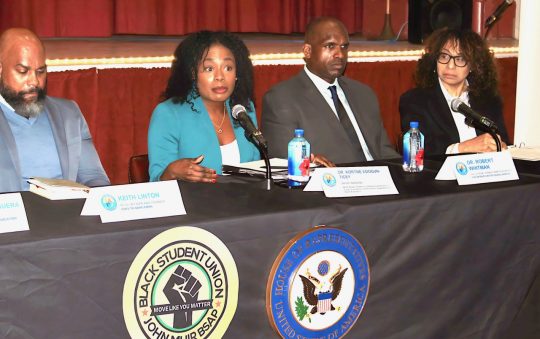
Illinois Gov. Bruce Rauner rejected posthumous clemency for an Illinois man imprisoned for the stabbing of an elderly woman, even though a serial killer confessed to the crime more than a decade after the inmate died.
Grover Thompson died in 1996 while serving a 40-year sentence for the attempted 1981 murder of 72-year-old Ida White in Mount Vernon, Illinois.
A Dec. 2 Illinois Prisoner Review Board letter provided to The Associated Press shows that Rauner denied clemency for Thompson in late November — nearly four years after the board, under former Gov. Pat Quinn, held a hearing on a petition filed by a Thompson family member. The one-sentence letter offers no explanation for the decision.
The clemency was denied even though in 2007 serial killer Timothy Krajcir confessed to former Carbondale, Illinois, police detective Paul Echols that he stabbed White. He also confessed that same year to a Cape Girardeau, Missouri detective Jimmy Smith. Both men testified before the Illinois panel on Thompson’s behalf, and both confirmed their accounts in separate conversations with the AP.
Krajcir is imprisoned for two southern Illinois killings, has received life sentences for five southeast Missouri killings and has pleaded guilty to killings in Kentucky and Pennsylvania. He admitted stabbing White in return for assurance from the Missouri detective that he would not be prosecuted for the death penalty in that state.
Rauner’s office declined further comment. So did review board chairman Craig Findley, citing a state law that requires the advisory board’s non-binding recommendation to the governor to remain confidential.
“There’s nothing to justify that decision,” Echols said.
Posthumous pardons are relatively rare. In his final days as Illinois governor in late 2014, Quinn granted clemency to three abolitionists convicted more than 170 years earlier for working on the Underground Railroad to help runaway slaves.
A University of Colorado researcher in 2011 tracked 20 posthumous pardons nationwide involving 107 individuals — 12 of whom had been executed.
Echols, who has written a book about the Krajcir killings, said that Krajcir described peeping through White’s windows when he came across an unlocked bathroom window, climbed in and hid in a shower stall before ambushing the woman when she entered the room.
White, now deceased, had said the intruder attacked her in her bathroom, slashing her with a pocketknife when she wouldn’t stop screaming. She described him as black, as did a neighbor who interrupted the attack and tried to keep the suspect from escaping through the window.
Krajcir is white. Thompson, who is black, was arrested near White’s house within a half hour of the attack, a bloody knife in his pocket.
Echols said that Krajcir’s dark hair and dark complexion led to a flawed identification by White of her attacker’s race. A White neighbor who later identified Thompson as the attacker said he was only shown one suspect in the police line-up.
Thompson’s supporters include the Illinois Innocence Project at the University of Illinois in Springfield. Director Larry Golden said the group may file again for clemency after waiting the required one year, but he was not optimistic.
“It was such an injustice. And a case that never should have resulted in a guilty plea,” he said.







